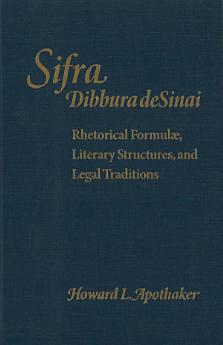Sifra, Dibbura de Sinai: Rhetorical Formulae, Literary Structures, and Legal Traditions
Howard L. Apothaker
Jul 2003 · Monographs of the Hebrew Union College Book 28 · Hebrew Union College Press
Ebook
464
Pages
family_home
Eligible
info
reportRatings and reviews aren’t verified Learn More
About this ebook
Sifra is the earliest extant rabbinic commentary on the book of Leviticus. On a basic level, Sifra presents and validates rabbinic law, but this was done by creating a link between a proposition, halakhic or not, and a scriptural passage. Scholars in the last few decades-including Neusner and Stemberger-have debated Sifra's relationship to Mishnah-Tosefta. Howard Apothaker demonstrates that the set of rules in Dibbura deSinai on topics shared with Mishnah-Tosefta can be understood as an independent body of law. They share a common ancestor but represent different expressions of a similar worldview and with variant purposes. The framers of Sifra sought as their main objective to validate the essentiality, or non-superfluity, of every word of Scripture. Apothaker's analysis of the exegetical and rhetorical characteristics of Sifra in Sifra, Dibbura deSinai: Rhetorical Formulae, Literary Structures, and Legal Traditions builds on his translation of and commentary on the section of Dibbura deSinai which covers Leviticus 25-27. Analysis of Sifra's highly formalized rhetoric yields insight concerning the general purpose(s) for which the framers created the work.
About the author
Howard L. Apothaker earned his rabbinical ordination and Ph.D. in rabbinic literature at HUC-JIR, Cincinnati. He has served as Rabbi for Temple Beth Shalom of Columbus/New Albany, Ohio since 1980.
Rate this ebook
Tell us what you think.
Reading information
Smartphones and tablets
Install the Google Play Books app for Android and iPad/iPhone. It syncs automatically with your account and allows you to read online or offline wherever you are.
Laptops and computers
You can listen to audiobooks purchased on Google Play using your computer's web browser.
eReaders and other devices
To read on e-ink devices like Kobo eReaders, you'll need to download a file and transfer it to your device. Follow the detailed Help Center instructions to transfer the files to supported eReaders.







